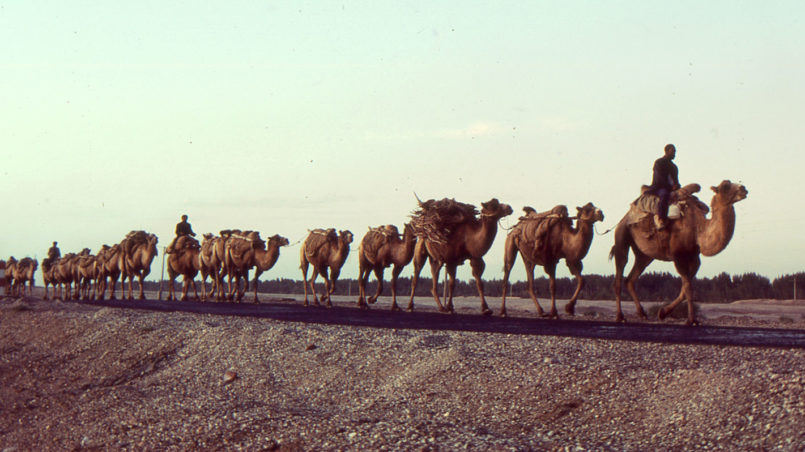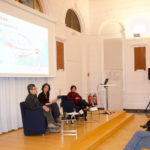China – Saving Capitalism?

Event data
- Datum
- 25. 1. 2018
- Host
- Austrian Kontrollbank
- Location
- Strauchgasse 3 1010 Wien
- Event-type
- panel discussion
- Participants
- Dr. Minqi Li , University of Utah, Salt Lake City, USA
- Dorothy Guerrero, Global Justic Now, London, UK
- Karin Fischer, Mattersburger Kreis für Entwicklungspolitik an den Österreichischen Universitäten/VIDC
With the “One Belt One Road“(OBOR) initiative, China is striving to build a more modern Silk Road. This is the largest infrastructure project in human history that could substantially change the dynamics of the global economy.
For this reason, a panel discussion entitled “China – Saving Capitalism” was held in the Reitersaal of the Austrian Kontrollbank on 25 January 2018. Speakers included Minqi Li, a Professor at the Institute of Economics at the University of Utah and Dorothy Guerrero of the NGO “Global Justice Now“, based in London.
China is one of the most prominent forces influencing the global economy. In a period of thirty years, the country will have achieved an annual economic growth rate of ten percent or more by 2010. According to Dorothy Guerrero of Global Justice Now, this growth in China did not happen overnight but has been the result of decades of planning in the economic sector.
To establish strong international economic partnerships, the Beijing government was initially required to establish an economic base within the country.
Since investment opportunities within the country were pushed to their limits and China had the highest foreign exchange reserves in the world, the logical consequence was that capital be invested externally. According to Guerrero, this development is comparable to that in the 18th century when capital in Europe had to flow outside the continent in order to generate growth in the early phase of capitalism.
The New Silk Road
The One Belt One Road initiative is an extensive infrastructure project with the potential to revolutionise world trade.
The “new Silk Road” will connect large parts of Europe with Asia via Iran and Turkey over a land route, starting from China. In addition, the maritime route would be strengthened by building ports and investing in infrastructure along the coasts of Southeast Asia, East Africa, and the European Mediterranean Sea.1
In total, the cost of infrastructure projects covering more than 60 countries has been estimated at $1 trillion.2 According to Guerrero, these developments would have a significant global and geopolitical impact. Some analysts even believe that, with the One Belt One Road Initiative, China would deprive the United States of its claim to global leadership and therefore shift the center of the global economy.3
At the recent World Economic Forum in Davos in January 2018, Chinese authorities proposed a new global economic order with Beijing as its focal point. 4 This signaled China’s determination to assume global economic leadership, Guerrero said. But the question she is asking herself is: What kind of leadership role should this be?
Globalisation 2.0
Since the end of the Second World War in 1945 and even after the fall of the Soviet Union, the liberal international world order with the leading role of the USA has dominated the architecture of the global world economy. International institutions such as the UN (United Nations), the IMF (International Monetary Fund) and the World Bank are spin-offs of this Western-dominated world order.
Is a transformation of the global world order with China as its new headquarters taking place due to the rapid rise of China in the last three decades, together with the aggressive infrastructure project of the new Silk Road? Is this an alternative economic model or is it merely a further development of the former world order, which maintains and ultimately “saves” capitalism?
Minqui Li looked to the past in order to address this: from his point of view, already in the 1970s, global capitalism was in a serious political and economic crisis, which was overcome by neo-liberal measures. Minqui Li:
As a response to this turmoil, the Western elite developed the approach of neo-liberalism, which met with strong opposition among the population. If there had not been an adequately large geographical area with a massive supply of low-wage labour at that time, neo-liberalism would probably not have been so successful.
China has therefore been incorporated into the global world economy, played an important role in stabilising global capitalism and at the same time enabled neo-liberalism to dominate in the West, according to Li.
Since profit and economic growth can be regarded as the driving forces of capitalism, a major project such as the new Silk Road would be conceivable as a progression of the prevalent capitalist system. According to Cao Wenlian, general director of a group which is part of the OBOR initiative, China’s plan is to lead the “globalisation 2.0“.5 Dorothy Guerrero believes that the conduct of the BRICS states, an international association in which China also plays an essential role, is a further indication that they support the same neo-liberal concepts of capitalism.
Genuine alternatives
Regardless of whether China or the United States assumes leadership in the ongoing process of globalisation does not alter the fact that an alternative economic model, which is truly oriented to the well being of mankind, does not focus on the global, but on the local level. These superpowers represent both systems of power, dictated from top to bottom. If this power dynamic is reversed, the individual person and his/her fellow citizens are empowered.
According to Guerrero, there are already many alternatives that would be used day by day by the communities living in the peripheral regions of the world. The question she asks herself is how we as human beings could make such alternative models a dominant thought? Dorothy Guerrero:
We are confronted with a considerable challenge which involves a struggle of ideas. Over the last 40 years, neo-liberalism and global capitalism have won this contest of thoughts.
Finally, she recalls that this year will be the tenth anniversary of the Financial Crisis of 2008. A crisis caused by megabanks acting with governments which rescued them with taxpayers’ money so that the game of global casino capitalism could continue. They are both in agreement as to whether capitalism should be saved: “No.” In case it is rescued, Li fears that mankind can no longer be saved.
Translation German-English: Anna Dichen
2 https://www.nytimes.com/2017/05/13/business/china-railway-one-belt-one-road-1-trillion-plan.html
3 https://www.globalresearch.ca/china-builds-new-type-of-globalization/5593451
4 https://www.weforum.org/agenda/2018/02/the-future-global-order-will-be-managed-by-china-and-the-us-get-used-to-it/
Credits
| Image | Title | Author | License |
|---|---|---|---|
 |
00-China-Saving-Capitalism_Steve-Whybrow- | Steve Whybrow | CC BY-SA 4.0 |
 |
Silk_Road_1992- | fdecomite | CC BY 2.0 |
